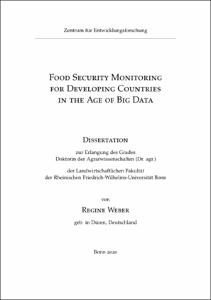Weber, Regine: Food Security Monitoring for Developing Countries in the Age of Big Data. - Bonn, 2020. - Dissertation, Rheinische Friedrich-Wilhelms-Universität Bonn.
Online-Ausgabe in bonndoc: https://nbn-resolving.org/urn:nbn:de:hbz:5-57353
Online-Ausgabe in bonndoc: https://nbn-resolving.org/urn:nbn:de:hbz:5-57353
@phdthesis{handle:20.500.11811/8172,
urn: https://nbn-resolving.org/urn:nbn:de:hbz:5-57353,
author = {{Regine Weber}},
title = {Food Security Monitoring for Developing Countries in the Age of Big Data},
school = {Rheinische Friedrich-Wilhelms-Universität Bonn},
year = 2020,
month = feb,
note = {Approximately 817 million people are currently estimated to be undernourished and 85 million people across 46 countries are estimated to be in need of food emergency assistance over the course of 2019. Conflict, migration and climate-related disasters are expected to further exacerbate already existing risks to food security. Important pillars that contribute to anticipating crises and informing a potential emergency response are early warning and monitoring systems. The emergence of big data as well as increasing Internet and mobile phone adoption rates across developing countries have enabled the inclusion of different, timelier, more frequent and spatially disaggregated data, as well as the at-risk population itself into monitoring systems. This dissertation is placed at the intersection of food security monitoring, early warning and big data.
The first part of this thesis focuses on exploring the information content of current early warning systems (EWSs) for food security risks. We evaluate the information content of the four largest international monitoring system for food security against a conceptual benchmark. We find that EWSs have partially moved towards the inclusion of more diverse indicators for risk monitoring. However, our results further show that timely information is missing, information is published irregularly and the geographical scope of monitoring systems is smaller than stated.
Subsequently, this thesis explores ways to improve monitoring systems for food security by using two strings of new data, i.e. Internet metadata and direct assessments from the at-risk population gathered via mobile phones. We test whether Internet metadata in the form of Google search queries (GSQ) can improve now-casts of crop prices in Ethiopia, Kenya, Mozambique, Malawi, Rwanda, Tanzania, Uganda, Zambia and Zimbabwe. In an pseudo-out-of-sample, one-step-ahead forecasting environment, we find models containing the Google search-string textit{maize} to beat the benchmark model in 8 of the 9 countries. By including the GSQ data, we reduce the now-casting error of maize prices between 3% and 23% and achieve the largest improvements for Malawi, Kenya, Zambia and Tanzania with improvements larger than 14%.
Furthermore, using a citizen-science approach this thesis analyzes whether the at-risk population can validly assess the food security status of their community, by collecting near real-time food security assessments over an 8 month period from the local population in Kenya. We test the validity of the gathered information against standard food security indicators, i.e. the food consumption score (FCS) and reduced coping strategy index (rCSI), using Pooled Poisson, Negative Binomial and Poisson Fixed Effects models. We find robust results that the assessments from the at-risk population conform to the FCS and rCSI observed during the study period.},
url = {https://hdl.handle.net/20.500.11811/8172}
}
urn: https://nbn-resolving.org/urn:nbn:de:hbz:5-57353,
author = {{Regine Weber}},
title = {Food Security Monitoring for Developing Countries in the Age of Big Data},
school = {Rheinische Friedrich-Wilhelms-Universität Bonn},
year = 2020,
month = feb,
note = {Approximately 817 million people are currently estimated to be undernourished and 85 million people across 46 countries are estimated to be in need of food emergency assistance over the course of 2019. Conflict, migration and climate-related disasters are expected to further exacerbate already existing risks to food security. Important pillars that contribute to anticipating crises and informing a potential emergency response are early warning and monitoring systems. The emergence of big data as well as increasing Internet and mobile phone adoption rates across developing countries have enabled the inclusion of different, timelier, more frequent and spatially disaggregated data, as well as the at-risk population itself into monitoring systems. This dissertation is placed at the intersection of food security monitoring, early warning and big data.
The first part of this thesis focuses on exploring the information content of current early warning systems (EWSs) for food security risks. We evaluate the information content of the four largest international monitoring system for food security against a conceptual benchmark. We find that EWSs have partially moved towards the inclusion of more diverse indicators for risk monitoring. However, our results further show that timely information is missing, information is published irregularly and the geographical scope of monitoring systems is smaller than stated.
Subsequently, this thesis explores ways to improve monitoring systems for food security by using two strings of new data, i.e. Internet metadata and direct assessments from the at-risk population gathered via mobile phones. We test whether Internet metadata in the form of Google search queries (GSQ) can improve now-casts of crop prices in Ethiopia, Kenya, Mozambique, Malawi, Rwanda, Tanzania, Uganda, Zambia and Zimbabwe. In an pseudo-out-of-sample, one-step-ahead forecasting environment, we find models containing the Google search-string textit{maize} to beat the benchmark model in 8 of the 9 countries. By including the GSQ data, we reduce the now-casting error of maize prices between 3% and 23% and achieve the largest improvements for Malawi, Kenya, Zambia and Tanzania with improvements larger than 14%.
Furthermore, using a citizen-science approach this thesis analyzes whether the at-risk population can validly assess the food security status of their community, by collecting near real-time food security assessments over an 8 month period from the local population in Kenya. We test the validity of the gathered information against standard food security indicators, i.e. the food consumption score (FCS) and reduced coping strategy index (rCSI), using Pooled Poisson, Negative Binomial and Poisson Fixed Effects models. We find robust results that the assessments from the at-risk population conform to the FCS and rCSI observed during the study period.},
url = {https://hdl.handle.net/20.500.11811/8172}
}






